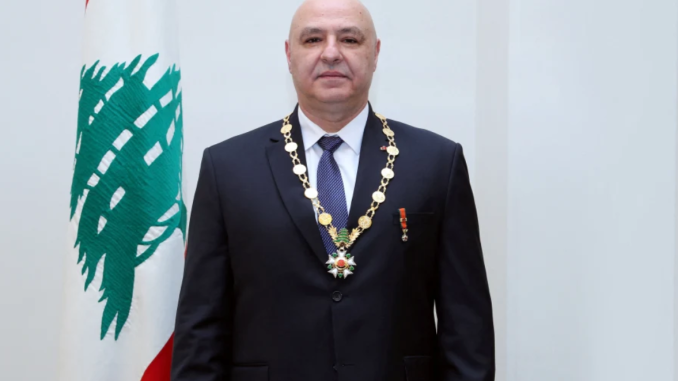 Newly-elected Lebanese President Joseph Aoun poses for a picture at the presidential palace in Baabda, Lebanon, January 9, 2025. Dalati Nohra/Handout via REUTERS
Newly-elected Lebanese President Joseph Aoun poses for a picture at the presidential palace in Baabda, Lebanon, January 9, 2025. Dalati Nohra/Handout via REUTERS
The country of Lebanon ended a two year period without a president when it elected Lebanese Army commander, General Joseph Aoun, to the position last Thursday.
The 61-year-old career soldier has a reputation for no nonsense leadership and a disdain for politics. He made a name for himself by leading Lebanon’s army during a period of severe economic crisis and challenge.
Although growing up in the town of Aaichiye in south Lebanon, Aoun was born in Sin al-Fil near Beirut in 1964.
He joined the Lebanese army in 1983 and climbed the ranks, becoming commander in chief of the army in 2017.
Soon after this appointment, Aoun was given the mission of expelling Islamic State and al-Nusra Front (later HTS) fighters from eastern Lebanon. This mission gave him international exposure and earned him praise from the West.
Aoun also has a reputation for working with various groups in Lebanon. During his tenure as army commander, Aoun worked together with Hezbollah in order to drive out the Syrian rebel groups, including ISIS elements and members of Hayat Tahrir al-Sham (HTS), the current leaders of Syria, who had begun operating in eastern Lebanon, along the Syrian border.
Aoun oversaw the army’s involvement in helping prevent anti-government protests in 2019 from turning violent, and most recently, he oversaw the military during the 14 months of conflict between Israel and Hezbollah, where he maintained a level head, reportedly instructing commanders to stay out of the fight, and only responding in a number of incidents in which IDF strikes injured or killed Lebanese Army soldiers.
Aoun has also overseen the army’s deployment in southern Lebanon as part of the ceasefire agreement with Israel, where the military is expected to occupy territories recently vacated by the IDF.
As required by the nation’s constitution, Aoun is a Maronite Christian. However, Aoun’s candidacy was opposed by one of Lebanon’s most influential Christian parties, the Free Patriotic Movement of former President Michel Aoun – no relation to Joseph Aoun.
The other major Christian party, the Lebanese Forces party, only endorsed him the night before the election.
Aoun’s election is unusual because the constitution bars a currently serving army commander from occupying the presidency, although that rule has been ignored in the past.
However, Aoun was a favorite candidate among international elements, particularly the United States and Saudi Arabia. Aoun’s relative political independence, especially his lack of direct connection to Hezbollah, and his disdain for the corruption which has plagued Lebanese politics were seen as key attributes to his international backers.
Imad Salamey, a Middle Eastern politics expert at the Lebanese American University praised Aoun’s lack of partisanship during his tenure as army commander, saying, “Under his leadership, the army maintained inclusivity and neutrality, protecting Lebanon’s stability amid crises. Aoun demonstrated independence and accountability, refusing to align the military with political factions. This stance, particularly in turbulent times, set him apart as a capable and principled leader.”
The fact that Aoun brings support from the United States and Saudi Arabia, both of whom have expressed an interest in helping Lebanon rebuild after the war, could help bring some stability to the country after years of scandal and outrage.
While the terrorist group Hezbollah, which also actively participates in Lebanon’s parliament as a political entity, originally opposed Aoun’s appointment, it grudgingly voted for him in the second round of voting after its own preferred candidate withdrew.
In his acceptance speech on Thursday, Aoun pledged to affirm the state’s right to maintain a “monopoly on the carrying of weapons.” This was interpreted by many in Lebanon as a challenge to Hezbollah’s own arsenal, much of which still sits south of the Litani River, and which Lebanon’s Army, under Aoun’s leadership, is supposed to confiscate.
While Aoun is not likely to directly challenge Hezbollah initially, his bold statements regarding the government’s sole responsibility to guard the nation, and his alignment with U.S. and Saudi interests, which counter those of Hezbollah, could see him take a stronger stance against the group.
In Israel, Aoun’s election was met with some appreciation and praise. While technically still in a state of ceasefire, many in the country hope that Aoun will take steps towards normalization with the Jewish State. Israel’s Foreign Minister Gideon Sa’ar was among the hundreds of dignitaries to congratulate Aoun on his election.



Yeah, right. Good luck with that.
Will MBS give up on Genocidal Islamism!
He wants a modern Saudi Arabia!!!!!